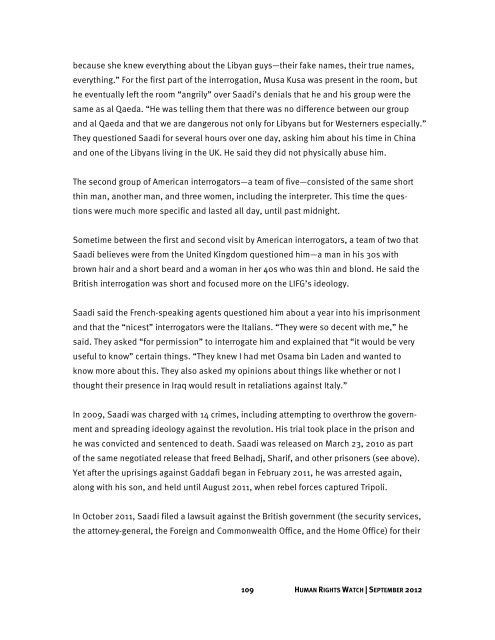Delivered Into Enemy Hands - Human Rights Watch
Delivered Into Enemy Hands - Human Rights Watch
Delivered Into Enemy Hands - Human Rights Watch
Create successful ePaper yourself
Turn your PDF publications into a flip-book with our unique Google optimized e-Paper software.
ecause she knew everything about the Libyan guys—their fake names, their true names,<br />
everything.” For the first part of the interrogation, Musa Kusa was present in the room, but<br />
he eventually left the room “angrily” over Saadi’s denials that he and his group were the<br />
same as al Qaeda. “He was telling them that there was no difference between our group<br />
and al Qaeda and that we are dangerous not only for Libyans but for Westerners especially.”<br />
They questioned Saadi for several hours over one day, asking him about his time in China<br />
and one of the Libyans living in the UK. He said they did not physically abuse him.<br />
The second group of American interrogators—a team of five—consisted of the same short<br />
thin man, another man, and three women, including the interpreter. This time the questions<br />
were much more specific and lasted all day, until past midnight.<br />
Sometime between the first and second visit by American interrogators, a team of two that<br />
Saadi believes were from the United Kingdom questioned him—a man in his 30s with<br />
brown hair and a short beard and a woman in her 40s who was thin and blond. He said the<br />
British interrogation was short and focused more on the LIFG’s ideology.<br />
Saadi said the French-speaking agents questioned him about a year into his imprisonment<br />
and that the “nicest” interrogators were the Italians. “They were so decent with me,” he<br />
said. They asked “for permission” to interrogate him and explained that “it would be very<br />
useful to know” certain things. “They knew I had met Osama bin Laden and wanted to<br />
know more about this. They also asked my opinions about things like whether or not I<br />
thought their presence in Iraq would result in retaliations against Italy.”<br />
In 2009, Saadi was charged with 14 crimes, including attempting to overthrow the government<br />
and spreading ideology against the revolution. His trial took place in the prison and<br />
he was convicted and sentenced to death. Saadi was released on March 23, 2010 as part<br />
of the same negotiated release that freed Belhadj, Sharif, and other prisoners (see above).<br />
Yet after the uprisings against Gaddafi began in February 2011, he was arrested again,<br />
along with his son, and held until August 2011, when rebel forces captured Tripoli.<br />
In October 2011, Saadi filed a lawsuit against the British government (the security services,<br />
the attorney-general, the Foreign and Commonwealth Office, and the Home Office) for their<br />
109 HUMAN RIGHTS WATCH | SEPTEMBER 2012
















